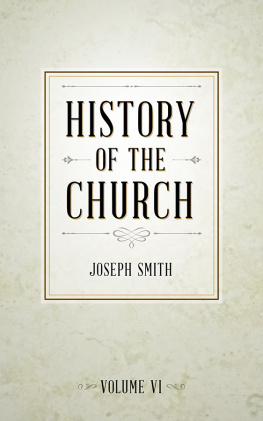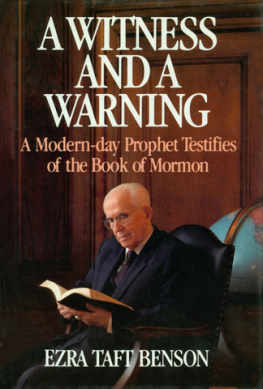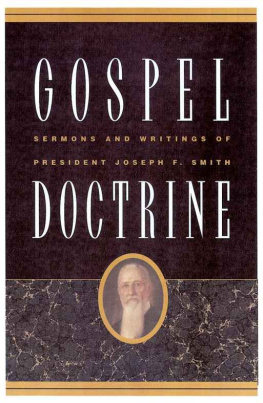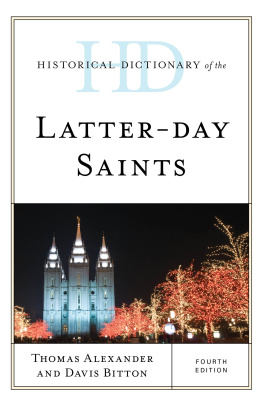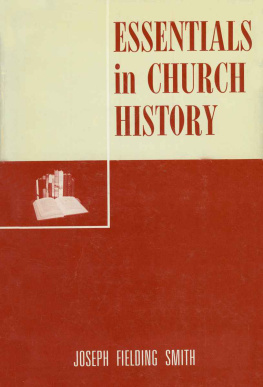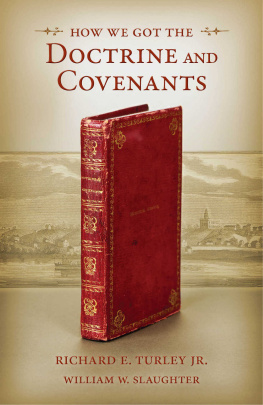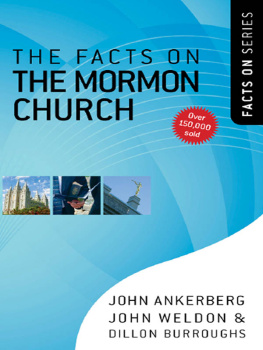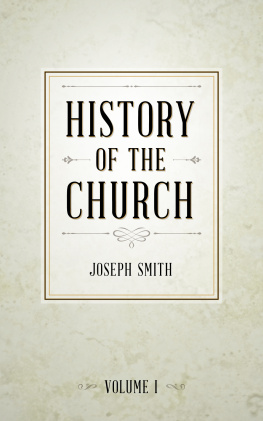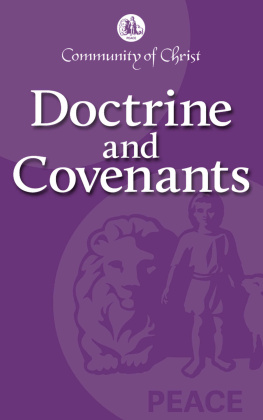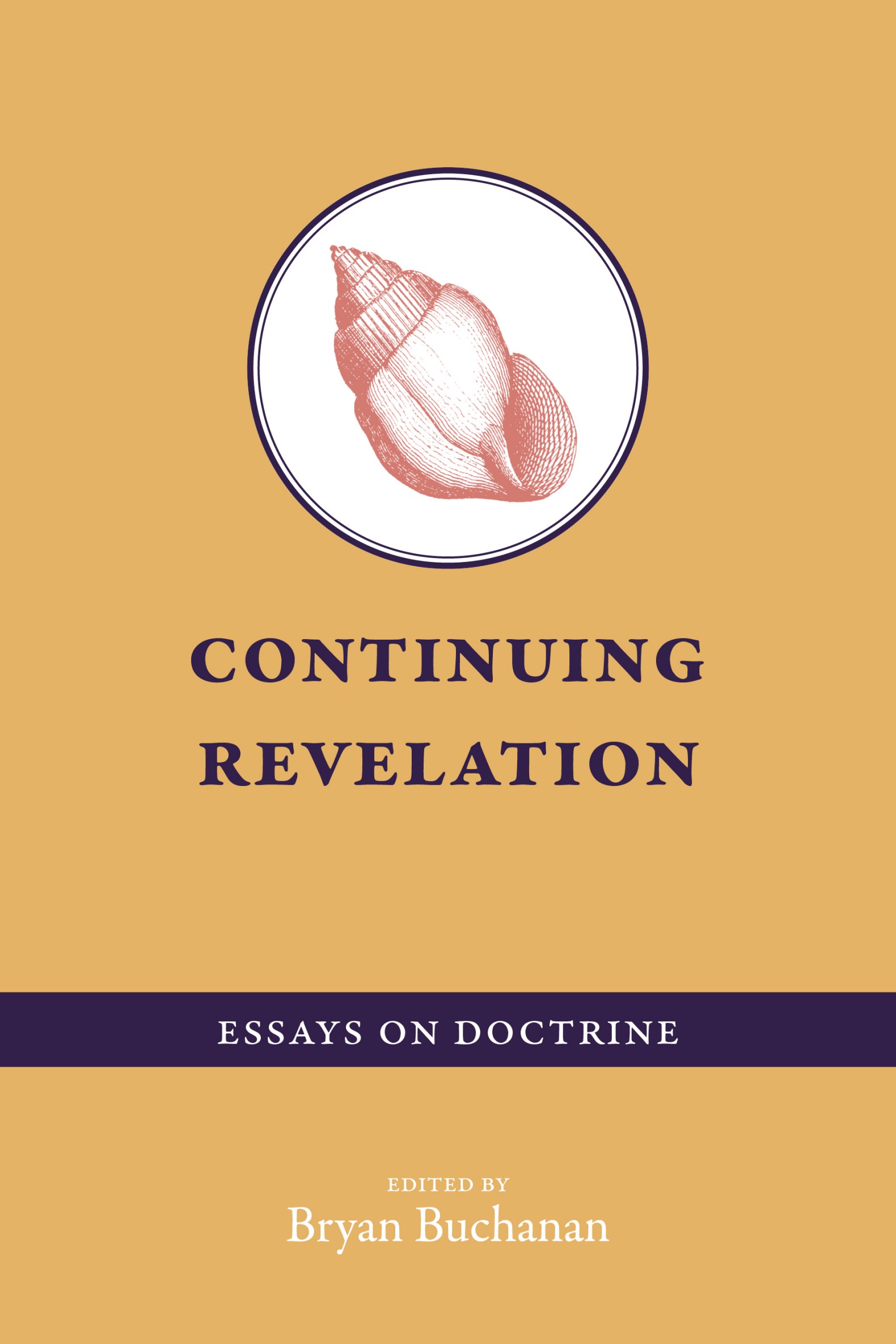Continuing
Revelation
Essays on Doctrine
edited by
Bryan Buchanan
Signature Books | 2021 | Salt Lake City
2021 Signature Books Publishing LLC. Signature Books is a registered trademark. All rights reserved. Printed in the USA. www.signaturebooks.com
The opinions expressed in this book are not necessarily those of the publisher.
Design by Jason Francis.
First edition | 2021
library of congress cataloging-in-publication data
Names:Buchanan, Bryan (Bookseller), editor.
Title: Continuing revelation : essays on doctrine / edited by Bryan Buchanan.
Description: First edition. | Salt Lake City : Signature Books, 2021. | Summary: Determining what is and what is not Mormon doctrine is a difficult endeavor. The Church of Jesus Christ of Latter-day Saints embraces four books of scripture as its canon, but also believes the church is led by a living prophet. Additions to the canon have been rare since the death of church founder Joseph Smith. Joseph Fielding Smith, tenth church president, said that if the prophet ever contradicts cannon, cannon prevails. On the other hand, Ezra Taft Benson, the churchs thirteenth president, said that the living prophets words are more important than cannon. Such messages create no shortage of confusion among church members. The question What is doctrine? opens the door for theologians and historians to wrestle over the answer, and to do so thoughtfully and insightfully. In Continuing Revelation, editor Bryan Buchanan has compiled essays that seek greater understanding about what doctrine is and why it matters Provided by publisher.
Identifiers:LCCN 2021014058 (print) | LCCN 2021014059 (ebook) | ISBN 9781560852933 (paperback) | ISBN 9781560853992 (ebook)
Subjects:LCSH: Church of Jesus Christ of Latter-day SaintsDoctrines. | RevelationChurch of Jesus Christ of Latter-day Saints. |
RevelationMormon Church. | Mormon ChurchDoctrines.
Classification:LCC BX8643.R4 C66 2021 (print) | LCC BX8643.R4 (ebook) | DDC 230/.9332dc23
LC record available at https://lccn.loc.gov/2021014058
LC ebook record available at https://lccn.loc.gov/2021014059
Editors Introduction
A wise observer of Mormon Studies, Bridget Jack Jeffries, once noted: An old adage among outsiders who study Mormonism states that determining what is and is not Mormon doctrine is a lot like trying to nail Jell-O to a wallexcept that the latter feat is entirely possible while the former remains a struggle to this day. To bolster her argument, she linked to instructions on how to go about nailing said Jell-O to a wall. Leaving this assessment aside, the fact is that serious study of Mormon ideas has flourished in the last two decades. Since the predecessor to this volume Line Upon Line : Essays on Mormon Doctrine was published more than thirty years ago, in 1989 (when I was nine years old), Mormonism is increasingly seen as a legitimate topic of scholarly analysis. University-level courses on Mormonism have proliferated and several Mormon Studies programs are now in place. As part of this burgeoning, methods and topics of interest have also matured. Cross-disciplinary approaches have led to a more robust field.
However, Jeffries is not wrong. The question at heartwhat is Mormon doctrineremains a difficult one. Understanding why requires a few related side journeys:
1.Relatively speaking, Mormonism is a fresh-faced youth among world religions, not having the benefit of centuries (or even millennia) to wrestle with its complexities.
2.Mormonism has generally eschewed, occasionally in borderline explicit fashion, systematic treatments of doctrine and theology. Only in recent decades has that changed somewhat.
3.With its identity so tenaciously constructed around the concept of continuing revelation, Mormonism has deliberately situated itself away from the closed-canon world of mainstream Christianity.
4.Continuing revelation, by definition, creates a fluid landscape that makes categorical assessment much more complex.
Working in a Mormon-focused bookstore, I am always amused to hear comments like, FOUR commentaries on the Doctrine & Covenantswhy so many?! At their ripe old ages, religions such as Christianity and Islamwith their thousands of theologians and writershave produced entire libraries of commentaries, systematic theologies, and doctrinal expositions. Mormonism has yet to complete its second century. While those years have been fairly robust in terms of per capita books published, particularly in recent decades, the process of historical maturity still needs time to unfold.
Mormonism has always had a complicated relationship with theologians. When future LDS Church apostle Orson F. Whitney prophesied of his people, We will yet have Miltons and Shakespeares of our own, he most certainly did not add and Thomas Aquinases and al-Ghazalis. True, Parley P. Pratts Key to the Science of Theology (first published in 1855) has been a staple of Mormon bookshelves since it came off the press, but Pratts book should be seen as more of an outlier than the norm. Gerald Bradford, who later directed the Neal A. Maxwell Institute at Brigham Young University, highlights some of the tensions, particularly as experienced by believers, thus:
For the Church, there is only one man who holds the keys. The prophet, seer, and revelator alone may come to know the things of God for the whole Church. Thus it is difficult to see how any Mormon theologian could mistake his role for that of the prophet. And it is doubly unfortunate if what a theologian says falls outside of what could count as meaningful discourse because not only does this render understanding difficult, if not impossible, but it also suggests that one may assume the ways of God are not reasonable. And revelation from God has always been viewed as reasonable.
Secondly, consider an even more important reason. Mormonism, despite the well-meaning intentions of a few rationalistic theologians in the Church, is first and foremost a revealed religion. The message and influence of the gospel must ultimately be accepted on the basis of individual initiative under the influence of the Holy Spirit. I contend there is simply no place for the alternative view that as a result of systematic or creative theology the gospel can be said to be made rational in such a way that it would be accurate to speak of a person genuinely embracing it solely upon the dictates of reason alone.
James Faulconer, a philosopher at BYU and seasoned observer of the state of Mormon theology, identified the absence of official rational explanations or descriptions of beliefs and practices, and the presence of differing and inconsistent explanations for and descriptions of belief within the membership of the church. The result, he argues, is that we are a-theologicalwhich means that we are without a church-sanctioned, church-approved, or even church-encouraged systematic theology. Reflecting a perspective that is certainly not unique among Mormons, he judged that is as it should be because systematic theology is dangerous.
Despite this history, the last quarter century is marked by renewed effort to engage Mormon doctrine. Authors like Terryl Givens, Adam Miller, and Joseph Spencer have moved extended, nuanced conversations on theology and doctrine squarely into safeor saferterritory.
*
The Greek word for doctrine used in the New Testament, didache , comes from a causative verb, didasko in essence causing someone to learn. In that spirit, the contributors to this volume marshaled their talents to cause you, as reader, to engage Mormon doctrine anew.
Well, what is our doctrine? So begins Loyd Isao Ericsons lead essay on The Challenges of Defining LDS Doctrine. David H. Bailey focuses on the key Christian concepts of omnipotence, omniscience, omnipresence, and omnibenevolence and their roles in LDS thought in LDS Theology and the Omnis: The Dangers of Theological Speculation. In a similar vein, Steven L. Peck looks at a longstanding discussion throughout Christianity in Crawling Out of the Primordial Soup: A Step toward the Emergence of an LDS Theology Compatible with Organic Evolution.


